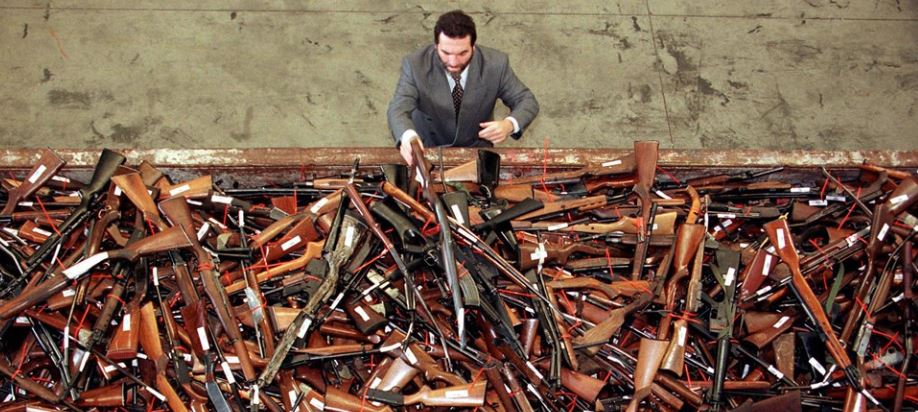
by Benjy Sarlin
Just remember this when you hear yet again someone condescendingly say “Nobody is trying to take your guns.”
A Democratic congressman has proposed outlawing “military-style semiautomatic assault weapons” and forcing existing owners to sell their weapons or face prosecution, a major departure from prior gun control proposals that typically exempt existing firearms.
In a USA Today op-ed entitled “Ban assault weapons, buy them back, go after resisters,” Rep. Eric Swalwell, D-Calif., argued Thursday that prior proposals to ban assault weapons
“would leave millions of assault weapons in our communities for decades to come.”
Swalwell proposes that the government should offer up to $1,000 for every weapon covered by a new ban, estimating that it would take $15 billion to buy back roughly 15 million weapons — and
“criminally prosecute any who choose to defy [the buyback] by keeping their weapons.”
In the past, Democrats and gun safety groups have carefully resisted proposals that could be interpreted as “gun confiscation,” a concept gun rights groups have often invoked as part of a slippery slope argument against more modest proposals like universal background checks.
Swalwell addressed these arguments directly, saying he and other Democrats had been too deferential to Second Amendment activists and should follow the lead of teenage survivors of the Parkland shooting who have been more strident.
“There’s something new and different about the surviving Parkland high schoolers’ demands,” he wrote. “They dismiss the moral equivalence we’ve made for far too long regarding the Second Amendment. I’ve been guilty of it myself, telling constituents and reporters that ‘we can protect the Second Amendment and protect lives.’”
Instead, he writes, “the right to live is supreme over any other.”
According to Swalwell, his policy is modeled on Australia’s mandatory gun buyback laws, which were instituted under a conservative government after a gunman killed 35 people at a popular tourist site in 1996. Supporters credit the campaign with a broad reduction in gun violence and the country hasn’t suffered a similar mass shooting in the years since.
“Australia got it right,” Swalwell wrote.
While politicians and activists, including President Barack Obama, have cited Australia’s success in curbing gun violence as an inspiration, almost no prominent figures have proposed instituting similar laws up to this point.
Some gun safety groups, such as the Giffords Law Center, have suggested tougher background checks and reporting requirements on existing assault weapons after a new manufacturing ban — but they have not called for owners to sell or destroy them. Many policy experts supportive of stricter gun laws have warned a mass gun confiscation policy would be difficult to enforce given limited federal resources and the widespread popularity of the affected rifles.
“I think it’s pretty clear from the program we do support that it’s about keeping guns out of dangerous hands and not about confiscating guns,” Kris Brown, co-president of the Brady Campaign, which advocates against gun violence, told NBC News in March.